What’s YOUR Business Credit and Funding Blueprint?
So it should be obvious – when considering business credit and funding, you need a blueprint. Because traveling without a map won’t get you anywhere.
So, where do you see your business in five years or more?
- Do you double your revenue?
- Open a new office?
- Replace your equipment?
- Hire more people?
- Retire and pass your business along to a family member or sell the company?
- Or something else?
Your Business Plans and Future
All of these scenarios require funding! Even going concerns with stable, steady revenue can experience emergencies, or need to seize a business opportunity quickly and before they have the funds. All businesses can use business credit to achieve their aims – whatever they are
Instead of year by year, let’s go phase by phase since some of these will overlap in time.
But even if you’ve already been there, done that, checking out the earlier phases could help you see if you missed anything. And if you’re just starting out, checking out the later phases could show you your business’s future so you can be ready.
Phase 1: Setup and Launch
You’re at the starting line and the race official has just yelled, “Go!”
Setting up a business is a task with a lot of moving parts. It’s a lot more than just hanging out a shingle. The way your business is set up can directly affect the ability of your business to succeed
This first phase covers your first six to twelve months of existence.
Fundability
Fundability is a business’s ability to get funding. A lot of the power to get business money is in your hands. A business starts with no credit profile. As a result, what’s on an application is all that’s reviewed for approvals. So your application must be very strong. Nearly half of all companies fail in their first 5 years, and about 2/3 in the first 10. As a result, new businesses don’t seem fundable to lenders. You can change that by building for fundability from the very start.
Business Name
Check with your Secretary of State –a business name may have to be unique. Make sure your SOS has all the necessary information for your company, and it’s up to date and correct. Make sure that you are in good standing with them and that your entity is active. You will have to file annual reports and pay an annual fee to stay active. Keep the name of a high-risk or restricted industry out of your business name. Your business can be Rachel’s rather than Rachel’s Gas Station. There is nothing underhanded about this – it is completely above board and honest
A common reason for loan and credit card application denials is the lender can’t easily locate a business offline or online. So make it painfully easy for lenders and credit providers to find your business. Make sure the business name is exactly the same on corporation papers, licenses, utility statements, and bank statements. Also make sure the business name and all other information is the same on every online listing you can find.
Business Address
This must be a real brick and mortar building, a deliverable physical address. This can never be a UPS box or a PO Box. Some lenders will not approve and fund unless this criterion is met
A virtual address can also be a good idea if you need to hold a meeting or an interview, and it’s a lot more professional than doing this at your kitchen table. We like Regus, Davinci, and Alliance Virtual Offices. But keep in mind that there are credit providers that will not accept virtual addresses.
Business Entity and EIN
Get a free EIN for your business and choose your business entity at IRS.gov. Use your EIN to open a bank account and to build a business credit profile. To truly separate business credit from personal credit your business must be a separate legal entity, not a sole proprietor or partnership. Only incorporating creates a new and separate entity which by default will reduce your personal liability. Other entities (like partnerships) don’t. File this with the Secretary of State for your state. Make sure your entity is set up in the same state as your business address.
NAICS Codes
The IRS website is also where you choose NAICS codes. These codes are for the purpose of collecting, analyzing, and publishing statistical data on the US business economy. Some businesses are considered to be risky by their very nature. Often higher risk comes from chances of injury or frequently engaging in cash transactions. Risk matters because there are several industries where lending institutions are hesitant to do business.
If more than one NAICS code can apply, you don’t have to choose the one that’s higher risk
And if only high risk codes apply, there’s nothing at all wrong with changing your business to match a related but lower risk code.
Business Licenses
Contact State, County, and City Government offices to see if there are any required licenses and permits to operate your type of business. Licensing requirements differ depending on state, town, and industry. Always make sure you have the proper licensing for your corporation
Having licensing builds credibility in your business, and that can help you get more customers.
Business Phone and 411 Listing
It’s very easy and inexpensive to set up a virtual local phone number or a toll free 800 number
A cell or home phone number as your main business line could get you flagged as un-established – but VOIP is okay. If you don’t want customers calling you at home all day, do not use a personal cell or residential phone as the business phone number. It also helps with fundability to have a dedicated business phone number. Your number must have a listing with 411 for most credit issuers and lenders to approve you. Check for your record to see if you’re listed and your information is accurate. No record? Then use ListYourself.net to get a listing.
Web Domain and Professional Website
Lenders and credit providers will research your corporation on the internet. It is best if they learned everything directly from your corporate website. Not having a professional website can hurt your chances of getting corporate credit. Buy web hosting from a hosting company like GoDaddy or HostGator. Your domain should be your business name, if possible. Add a company email address for your business on the same domain as your website. This often comes with a website domain provider. This is not just professional; it also greatly helps your chances of getting approval from a credit provider. Do not use Yahoo, AOL, Gmail, Hotmail, or similar kinds of email.
Business Bank Account in the Business’s Name
You must have a bank account devoted strictly to your business. The IRS does not want you commingling funds. Make accounting easier and reduce the risk of audit at tax time
Keep personal and business funds separate. Having a business-only bank account makes that easy.
Business Merchant Account
Getting a business merchant account is a smart way to help out your business. Now your business will be able to accept credit and debit cards. Studies show that customers will spend more if they can pay by card. This also increases your finance options and is generally more secure.
Get Set Up With the Business Credit Reporting Agencies
Go to D&B’s website and look for your business. Can’t find it? Then get a free D-U-N-S number on the D&B site. A D-U-N-S number plus 3 payment experiences leads to a PAYDEX score. You need a D-U-N-S number to start building business credit. Once you are in D&B’s system, search Experian and Equifax’s sites for your business.
Your Business Credit History
Get the most favorable funding by paying all bills on time, to get:
- A PAYDEX score of 80
- Equifax Credit Risk Score of 90 or better
- A good FICO SBSS score, which is driven (in part) by on-time payments and business credit history
- For Experian, historical behavior (payment history) is 5-10% of the total score
Business Credit Building from the Ground Up
Start with vendor accounts, a proven way to start building business credit. Vendor credit is generally not attached to a bank. So under federal law a Social Security number is not required. When not attached to a bank, there is no Social Security requirement for starter vendor credit
This is unlike bank loans and bank cards. You can legitimately leave the SSN field blank, which will force them to pull your business credit under your EIN.
Business Credit Building with Credit Cards with a PG
Every step and every credit provider is designed to help your business
It’s designed to help you qualify for business credit cards that you will actually use. As you continue building, your time in business will help. But to get started, you may need to give a personal guarantee. That’s okay; that’s a part of the strategy.
Good Personal Credit
If you already have good personal credit, then you’re all set. If not, you can work with a credit partner or guarantor. And never stop working on improving your personal credit, no matter what shape it’s in.
Phase 1 Funding Options
In Phase 1, it’s trickiest to get business credit and funding. But it’s not impossible! You will, though, need to think outside the box.
Our Credit Line Hybrid
A credit line hybrid is a form of unsecured funding. Our credit line hybrid has an even better interest rate than a secured loan. Get some of the highest loan amounts and credit lines for businesses. Get 0% business credit cards with stated income. These report to business CRAs so you can build business credit at the same time. This will get you access to even more cash with no personal guarantee. You need a FICO credit score of at least 680 or a guarantor with good credit to get an approval. No financials required.
We also have an option for getting just personal credit cards with our Credit Line Hybrid.
Demolish your funding problems with 27 killer ways to get cash for your business.
401(k) Financing
This is not a loan and you will not have to pay an early withdrawal fee or a tax penalty. You put the money back by contributing, just like with any 401(k) program so you won’t lose your retirement funds. The IRS calls this a Rollover for Business Startups (ROBS), which is a separate entity with its own set of requirements. The plan, through its company stock investments, rather than the individual owns the trade or business. This financing isn’t a loan against, your 401(k), so there’s no interest to pay and does not use the 401(k) or stocks as collateral.
Instead, this is simply a movement or change of custodian. Your 401(k) must have more than $35,000 in it and cannot be from a business where you are currently employed. You can get 401(k) financing even with severely challenged personal credit.
Stocks Financing
Some lenders will make loans using securities as collateral. Securities-based lending provides ready access to capital. The only restrictions to this kind of lending are other securities-based transactions, like buying shares or repaying a margin loan. You continue to earn interest on stocks pledged as collateral. But you will have challenged personal credit.
Sell Part of Your Business’s Equity
Your business and its potential are assets. Talk to people you know about angel investing
Angels buy a smallish stake in your company. They usually don’t expect as big a return as venture capitalists do. VCs might also buy a stake, but they generally just want paradigm-changing businesses. Another way to sell a part of your equity is to take on another founder or partner.
Crowdfunding and Grants
Note: crowdfunding success isn’t guaranteed. Crowdfunding platforms like Kickstarter will take a percentage of any money you raise. But it can still be a way to get a cash infusion without having to give up equity. If you’re very good online and have a compelling product and story, then you’re more likely to succeed than most people. Grants can come from the government or private businesses. Expect a lot of competition, difficult entry requirements, and not a lot of money. But it’s another way to get some cash without having to sell a chunk of your business .
Phase 1 Goals for Business Credit and Funding
Right now, you have minimal Growth Monthly Revenue (GMR). This is a fast paced growth plan, throw it against the wall and take what you can get right now. Look at some short sighted daily and weekly goals for quick cash and growth. During this phase your focus is on the bare essentials to create a viable business. Your goal is to build your consistent revenue to $10,000 per month, and continue to work on improving your personal credit.
Phase 2 Development: $1,000 to $10,000 GMR
In Phase 2, you should start developing marketing. ow you’re at an aggressive sales pace adding nurture and longer sales cycles. Use medium term monthly growth planning (campaign to campaign). It’s time for software implementation and system development. You’re building the blocks of how your business is going to be, now and in the future. This phase should run somewhere between the first six to 24 months from launch.
Business credit and funding starts to get easier.
Phase 2 Credit Options
Your credit options will open up once you get to Phase 2, including:
- Business Credit Cards (No PG)
- Advanced Vendors
- Vehicle Financing
- Cash flow Management with providers like Brex and Divvy
- Business Credit Cards With No Personal Guarantee
As you continue to build exceptional business credit and pay your bills on time, credit providers trust you more and more. You can get higher limits and better terms. And you can start to get business credit cards with no PG.
Advanced Vendors
There are many vendors that do not report to the business credit reporting agencies unless you default. They’re still a good idea, because credit can help you beyond business credit building
Not having to put up 100% of the costs of equipment or a building or anything else can help with budgeting. Credit can sometimes be the only way to take advantage of a limited time opportunity if you don’t have the money right now. And if your business credit cards offer rewards, cash back, or points, then using them is to your advantage.
Vehicle Financing
Vehicle financing is a great way to get a business vehicle without having to wait until you can just pay cash and drive it off the lot. Note: business owners may be required to personally guarantee vehicle loans. If you are a co-borrower the loan will most likely report to your personal credit report.
Some loans have a prepayment penalty and charge you for paying ahead. It is a good idea to have a loan proposal. A loan proposal should detail your business, loan needs, and financial statements.
Cash Flow Management
Managing small business finances can be overwhelming. There are a number of tools that can help streamline the process. Options like Brex, Divvy, Expensify, Lola, and more are growing in popularity. Which one is right for your business?
Brex
Brex is a business money management system that integrates with your accounting software
It allows you to track expenses and, depending on the level of service you choose, it can also help with paying bills and controlling spending. Brex has a partnership with the FDIC and your funds are secure. Everyone who opens a Brex cash account gets a corporate card. Brex reports any payments to Dun & Bradstreet
Divvy
One thing to know: Divvy is very similar to Brex. Divvy reports to the Small Business Finance Exchange, which in turn provides data to all SBFE partners, including business credit bureaus. As of April 2021, they also report to Dun & Bradstreet directly.
Demolish your funding problems with 27 killer ways to get cash for your business.
Phase 2 Funding Options
In Phase 2, your funding options also open up, to:
- Merchant Cash Advances
- Revenue Lending
- Lines of Credit (Fundbox)
- Equipment Financing/Leasing
- Invoice Factoring
Merchant Cash Advances
An MCA technically isn’t a loan; it’s a cash advance based on the credit card sales of a business. A small business can apply for an MCA, and have an advance deposited into its account fairly quickly. So you can offer Net 30 terms but not have to wait a month to get paid. With an MCA you get funding based strictly on cash flow as verifiable per business bank statements. A lender mainly just wants to see consistent deposits.
Business Revenue Lending
You can technically qualify with only one year in business, but the annual revenue requirement is high enough that phase 2 may make more sense. You can raise capital from investors who get a percentage of the enterprise’s ongoing gross revenues in exchange for money invested until a predetermined amount is paid. Often this predetermined amount is between 3 – 5 times the original amount invested. Monthly payments will fluctuate with revenue highs and lows and will continue until you’ve paid back the loan in full.
Fundbox
Fundbox will connect directly to your online accounting software when deciding whether to fund your business. You can get revolving line of credit for up to $100,000. Fundbox will auto debit your weekly payment from your bank account. You don’t need to show a minimum personal credit score or a minimum time in business, but ideally you must have 6 months in business or more.
Equipment Financing
Use a loan or lease to purchase or borrow hard assets for your business. Physical assets can include items such as a restaurant oven or a company car. Pay predictable amounts every month. You can build business credit on a program like this.
Equipment Leasing
Or lease equipment, rather than buy it outright. You will often put down less money than you would if you were buying the equipment. You may be able to negotiate flexible terms with an equipment lease, and it’s easy to upgrade equipment after your lease ends. This is helpful if your equipment is something like a computer which quickly becomes obsolete.
Equipment Sale-Leaseback
If you already own your equipment free and clear you can use that as collateral for financing
Sell equipment to a lender for cash. Then lease it back from them. You can unlock Section 179 tax savings, and depreciate your entire equipment purchase in the first year. You’ll need at least one larger piece of higher value equipment to qualify.
Invoice Factoring
If you have open invoices and are extending credit to customers in some form, then you can get paid faster with factoring. Usually this involves invoices with net terms, like net 30, 60, or 90. To be paid faster, you turn those invoices over to a factoring company. They immediately give you an agreed upon percentage of the total of the invoices, like 80%. When your customer pays, the factoring company keeps their fee, and they send you the rest. But note – factoring only works if your customers pay.
Phase 2 Goals for Business Credit and Funding
Your goals should be:
- Strong Business Credit (10 to 12 Accounts)
- Good personal credit
- Build consistent revenue to $10,000 or more a month
Always develop business connections in your community and with potential lenders.
Phase 3: Growth: $10,000 to $2 Million GMR
Successful growth…it’s working! It’s time to start optimizing systems and operations. You’ll be undergoing massive team and infrastructure development, and long term growth and planning for semi-annual to annual focus lifetime customer value. You’ll need to make some high level strategic hires (Managers, VP’s, Essential C levels). This phase will happen at about 24 months or more from launch.
Business credit and funding gets a lot easier now.
Phase 3 Credit Options
Your Phase 3 credit options put your Phase 1 and Phase 2 options on steroids, with:
- Team access to vendors and cards
- Continuing to grow your vehicle fleet with vehicle financing
- Vendor portfolio growth
Phase 3 Funding Options
Phase 3 opens your funding options up to:
- All Alternative options available
- SBA Loans
- Bank Loans
Alternative Loans (also called private lending)
Private lenders are generally funded by investors or by banks, or both. Private lenders are in the business of taking funds from private investors. They make private business purpose loans with those funds. This often involves real estate. These can be hard money loans with shorter terms.
Alternative Options
Alternative lending also means online lending. But for certain industries, online lending is one of the only ways to get money. So let’s look at the cannabis industry, for example. Medical cannabis is legal is most of the country, yet more traditional lenders are still less likely to approve a loan. But lenders that specialize in cannabis industry lending are out there.
SBA Loans
More time in business will make SBA loans a real possibility for your business. It’ll be easier to get an SBA loan in Phase 3 versus earlier. This is because you can more readily show your business is established and making money. Demonstrated profitability and responsible credit and bank account management will improve your chances of getting an approval for an SBA loan. Also – SBA loans have great terms! So there’s a reason why you should be striving to be eligible for one.
Bank Loans
Banks are often the first place we think of when we thinking of financing. But big banks only sign off on about 25% of the small business loan applications that come their way. Still, term loans often have lower interest rates than many other funding options. They also tend to be for higher loan amounts. But you will most likely have to undergo a personal credit check and/or provide collateral.
Demolish your funding problems with 27 killer ways to get cash for your business.
Phase 3 Goals for Business Credit and Funding
In Phase 3, your mission is to take your business to the next financial level, so your goals are:
- Profitability (so as to calculate loans)
- Maintaining good personal and business credit
- Build up to $2,000,000 in annual gross revenue
- Maximizing leverage of cash flow with vendors and business credit
Grow Your Vendor Portfolio with Retail Credit
Retail credit comes from major retailers like Staples. You can buy everything from office supplies to power tools. Retailers will check whether your business information is uniform everywhere. They will also check whether your business is properly licensed. Terms can be revolving. You will need at least 3 (more would be better) accounts reporting to the business CRAs.
Grow Your Vendor Portfolio with Fleet Credit
Fleet credit is used to:
- Buy fuel
- Maintain vehicles of all sorts
- Repair vehicles
These tend to be gas credit cards. But there may be a minimal time in business requirement.
Grow Your Vendor Portfolio with Business Credit Cards
Business credit cards are more universal-type credit cards, like MasterCard. So they can be used pretty much anywhere. These cards may even have rewards programs. Terms can be revolving. Often you will need to have at least 14 accounts reporting to the business CRAs. Also, there can be longer time in business requirements.
Phase 4: Maturity: $2M to 5M+ Annual Income
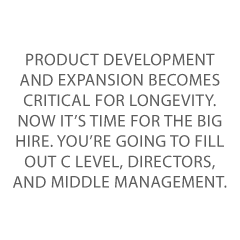 Consistent growth is key. You’re aiming for long term consistent and stable growth, and moving toward market domination (Competitor Buyouts and Acquisitions). Product development and expansion becomes critical for longevity. Because now it’s time for the big hire. You’re going to fill out C Level, Directors, and middle management. This phase will happen at around four to five years from launch.
Consistent growth is key. You’re aiming for long term consistent and stable growth, and moving toward market domination (Competitor Buyouts and Acquisitions). Product development and expansion becomes critical for longevity. Because now it’s time for the big hire. You’re going to fill out C Level, Directors, and middle management. This phase will happen at around four to five years from launch.
It should be no problem to get business credit and funding when you’ve hit this stage.
Phase 4 Credit Options
By Phase 4, the sky is pretty much the limit! You should be able to get:
- Most major credit cards with no PG
- All vendors should be accessible
You should be able to leverage reports for specific vendors. This includes asking for a credit line.
Phase 4 Funding Options
In addition to everything we’ve already talked about, your business can take full advantage of:
Private equity
- Investors
- You might even sell shares in your corporation, or go public!
- Phase 4 Goals for Credit and Funding
Now you’re playing the long game. Your mission is to look to the future and help your business for decades to come.
Therefore, you need to:
- Balance your costs vs your cash flow vs your business’s profit
- Leverage funding for expansions and buyouts
And you should be maximizing leverage of cash flow with vendors and business credit.
Phase 5: Exit
By this time, your business should be very well established. At this phase, you want to cash in on all the work you have invested. This is where the funding and credit has the long game return. A Business Credit Portfolio is transferable and increases the value of your business.
Your proven track record with merchant cash advances or revenue lending pays off big time, since it can keep business cash flow moving through the ups and downs. Having a proven track record with the SBA, and a profitable banking relationship, will improve the value of your business as well. People want to buy something they can lend against if they need to.
Phase 5 Business Credit and Funding Options
Selling can mean you’re retiring, or maybe you’re exchanging one form of entrepreneurship for another, and want to change industries yet remain an entrepreneur.
In Phase 5, you can:
- Self-fund the sale in structured buy outs
- Go to the SBA for acquisition money
In essence, you should be prepared to sign for your own buyout. Because a profitable, seasoned business can be an exceptionally valuable legacy.
Your Business Credit and Funding Blueprint: Takeaways
From startup to exit, your business credit and funding options will change. But navigating all the nuances can be tricky. Let’s walk that path together.
The post How to Create Your 5 Year Business Credit and Funding Blueprint appeared first on Credit Suite.
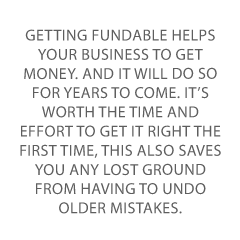
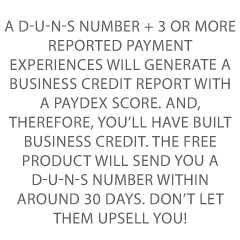 To build business credit, you will need a D-U-N-S number from Dun & Bradstreet. A D-U-N-S number + 3 or more reported payment experiences will generate a business credit report with a PAYDEX score. And, therefore, you’ll have built business credit. The free product will send you a D-U-N-S number within around 30 days. Don’t let them upsell you!
To build business credit, you will need a D-U-N-S number from Dun & Bradstreet. A D-U-N-S number + 3 or more reported payment experiences will generate a business credit report with a PAYDEX score. And, therefore, you’ll have built business credit. The free product will send you a D-U-N-S number within around 30 days. Don’t let them upsell you!
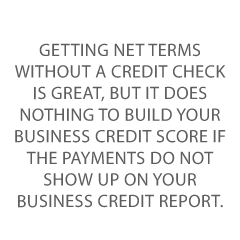
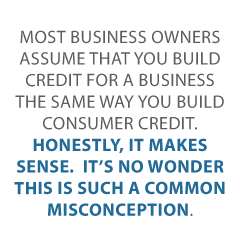


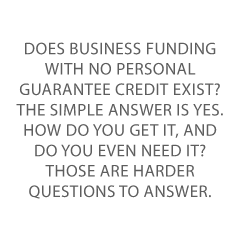
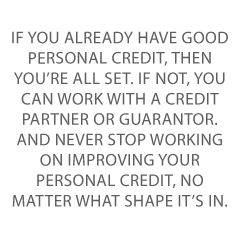
 Consistent growth is key. You’re aiming for long term consistent and stable growth, and moving toward market domination (Competitor Buyouts and Acquisitions). Product development and expansion becomes critical for longevity. Because now it’s time for the big hire. You’re going to fill out C Level, Directors, and middle management. This phase will happen at around four to five years from launch.
Consistent growth is key. You’re aiming for long term consistent and stable growth, and moving toward market domination (Competitor Buyouts and Acquisitions). Product development and expansion becomes critical for longevity. Because now it’s time for the big hire. You’re going to fill out C Level, Directors, and middle management. This phase will happen at around four to five years from launch.